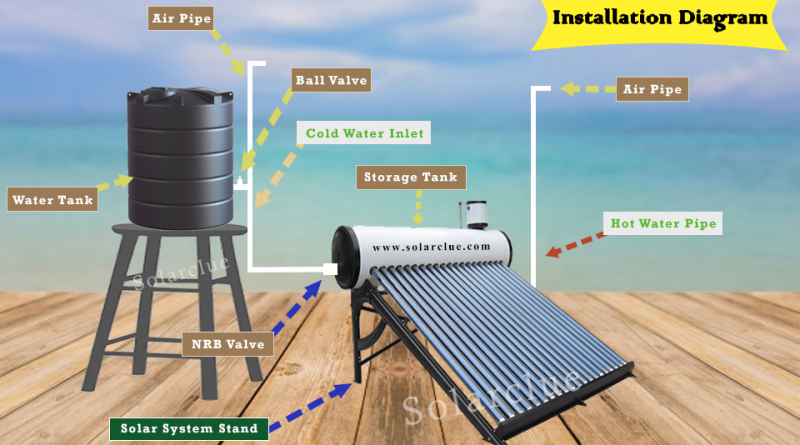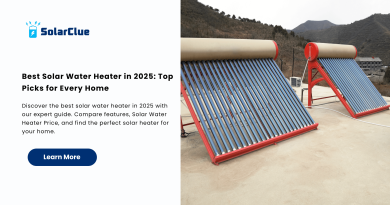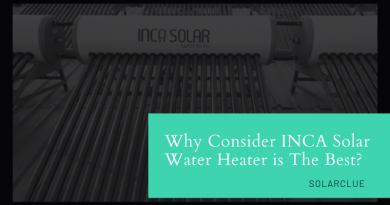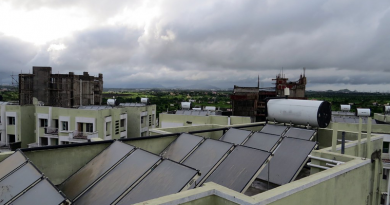Solar Water Heater Installation Process
You want to have solar water but still thinking about whether solar hot water is right for you, and if this is the case, you need to understand the installation requirements, which can be helpful to better grasp the possibility of a solar hot water project for your home.
Table of Contents
Six Steps to Solar Water Heater Installation
There are generally six steps to solar hot water installation that any installer installing a solar hot water system will likely follow. Have a look!
1. Mount the solar collectors
The first step of most solar hot water installations is to put the solar collectors (similar in shape to photovoltaic solar panels, and also will lie flat on your roof) in place on your roof. The installer makes sure of mounting the collectors properly and therefore, he may need to remove portions of your roof shingling and expose the flat tar paper that acts as protection between your shingles and roof deck. Once a suitable surface has been found or created, the collectors are plotted into place and screwed directly into the roof deck and underlying rafters.
2. Install the storage tanks and heat exchanger
The second step is to fix the storage tank, which is the largest part of a solar hot water system as your collectors need a storage tank where they can send their heated antifreeze transfer fluid. The storage tank is usually located in a basement or utility closet, where that can accessible by water lines and antifreeze tubing. You can choose to install any number of storage tanks, and that is based on the size of your home and your water usage.
3. Install piping systems for the antifreeze fluid
Next, your installer will run flexible piping from your roof to your new storage tank or tanks to connect your collectors to the heat exchanger and storage tanks. Since antifreeze fluid leaves from one pipe on the side of your collectors and runs down to the heat exchanger, an additional line is installed to connect the end of the heat exchanger back up to your rooftop so fluid can be cycled.
And, installing these antifreeze piping paths (one for the piping that brings antifreeze down, and one for the piping that sends it back to the collectors) requires access to your roof, which will almost always mean cutting a couple of holes in the roof deck, and those holes don’t need to be larger than the pipe diameter. Further, the wholes can easily be covered with insulating material and replacement shingles as the installation are being finalized.
4. Install water transport pipes
As water with antifreeze fluid needs to be cycled through your new solar hot water setup and water transport lines are required to be run from your storage tank to the rest of your home. Your installer does remove your water connection from your old hot water setup and connect it to your new storage tank and the backup system as your home likely already has the appropriate water distribution lines set up.
5. Install control systems
Then, the installer needs two temperature sensors to be connected with wiring and installed along with your hot water system; one sensor should be connected to your collectors, and another one to the base of your storage tank. Thereafter, both the devices will connect to the central control system for providing guidance on when to circulate antifreeze fluid. For example, if the temperature at the collector is lower than the temperature in the tank, there’s no reason to circulate fluid, however, doing so will cool your water.
6. Insulate the system
The last step in any solar hot water installation job is to insulate each part once all of the pieces are in place. Your installer will plug holes in your roof, insulate piping, and ensure that all connections between components are sealed. Properly insulating the system is crucial because any energy lost through the piping or storage tank means lost savings.
Advantages of Installing a Solar Water Heater
Installing a solar water heater offers numerous benefits, both in terms of energy efficiency and environmental sustainability. Here are the key advantages using solar-specific terminology:
1. Reduced Energy Consumption
2. Environmentally Friendly
Solar water heaters are a green energy solution, as they rely on renewable resources—specifically, solar radiation—to heat water. Unlike traditional water heating systems that rely on fossil fuels, solar water heaters produce no harmful greenhouse gas emissions, helping to combat climate change and reduce your overall carbon footprint. By using a solar water heater, you are supporting sustainable energy practices.
3. Low Operating Costs
After the initial installation, solar water heaters have minimal operating costs. The energy source, solar energy, is free, and since there are fewer moving parts compared to traditional heaters, maintenance costs are lower. Solar collectors typically absorb sunlight, and since the system doesn’t rely on fuel or electricity, you are protected from fluctuating fuel prices.
4. Energy Independence
Solar water heaters increase your household’s energy autonomy by reducing reliance on external energy providers. With solar thermal systems, you become less dependent on the electrical grid or gas supply, particularly beneficial in regions with high energy prices or frequent power outages. Having your own solar collector system provides a buffer against energy price volatility and supply disruptions.
5. Long-Term Investment with High Return
A well-installed solar water heater can last up to 20 years or more, providing a reliable source of hot water over its lifespan. The system’s payback period is typically within a few years, depending on energy consumption and local solar conditions. Once the system has paid for itself through energy savings, all subsequent hot water is essentially free, offering a high return on investment (ROI).
6. Boosts Property Value
7. Government Incentives and Rebates
In many regions, governments offer incentives or tax credits for installing solar water heaters, reducing the upfront cost of the system. These incentives, combined with the savings on energy bills, make solar water heating systems an even more affordable and attractive investment. Be sure to check for local or national solar incentives or subsidies that can help offset installation costs.
8. Reduces Peak Load on Grid
Using solar energy to heat water reduces your demand on the power grid, especially during peak times. This helps stabilize the grid and lowers the environmental impact of producing electricity from non-renewable sources. Installing a solar water heater not only cuts energy bills but also supports renewable energy. With government incentives, it’s a cost-effective, eco-friendly solution for both homes and businesses.
All these benefits can be obtained when you install from the best solar water heater brand Sudarshan Saur.
Wrap Up
A solar water heater is an incredibly beneficial choice if you’re trying to figure out how to cut traditional electric water heating expenses. Solar water heating systems are designed to heat water using collected sunlight, and they can be connected alongside a standard water heater to lower costs without reducing convenience.
It is an important factor to work with a reputed professional solar water heater installation company to make sure your solar hot water is correctly set up with no trouble at all. We, at SolarClue, are one of the trustworthy yet fastest-growing solar companies and solar water heater suppliers that offer you a cost-effective and reliable choice for hot water. SolarClue is the best choice for you if you think about how to install solar water heater or how to get solar water heater installation service.
The company (buy solar water heater online at an affordable price) has positioned itself to be the best B2B and B2C platform for those contractors and customers who demand the utmost reliability, performance, and cost-effective solar heating systems.





Pingback: Solar Water Heater in Pune - Get upto 50% Off - Solarclue
Pingback: Solar Water Heater in Mumbai - Free Shipping - Solarclue
Pingback: Buy Solar Water Heater in Chennai at Best Price - Solarclue
Pingback: Top Solar Water Heater in Ahmedabad - Top Brands - Solarclue
Pingback: Solar Water Heater in Kolkata - Discount Available - Solarclue
Pingback: Solar Water Heater in Jaipur - Get Upto 50% Discount - Solarclue
Pingback: Solar Water Heater in Visakhapatnam - Upto 50% Discount - Solarclue
Pingback: Solar Water Heater in Lucknow - Free Shipping - Solarclue
Pingback: Solar Water Heater in Agra - Up to 50% Discount - Solarclue
Pingback: Solar Water Heater in Chandigarh - Lowest Price - Solarclue
Pingback: Solar Water Heater in Kanpur - Discount Available - Solarclue
Pingback: Solar Water Heater in Varanasi, India - Free Shipping - Solarclue
Pingback: Solar Water Heater in Nashik - Free Installation - Solarclue
Pingback: Solar Water Heater in Dehradun, India - Discount Available - Solarclue
Pingback: Best Solar Water Heater in Meerut, India - Reasonable Price - Solarclue
Pingback: Solar Water Heater in Ludhiana, India - Free Shipping - Solarclue
Pingback: Solar Water Heater in Thiruvananthapuram, India - Solarclue
Pingback: Buy Solar Water Heater in Aurangabad, India - Solarclue
Pingback: Solar Water Heater in Bhubaneswar, India - Lowest Cost - Solarclue
Pingback: Solar Water Heater in Dhanbad, India - Upto 50% Off - SolarClue
Pingback: Solar Water Heater in Bhilwara, India - Upto 50% Off - SolarClue
Pingback: Solar Water Heater in Panihati, India - Upto 50% Off - SolarClue
Pingback: Solar Water Heater in Agartala, India - Upto 50% Off - SolarClue
Pingback: Solar Water Heater in Gopalpur, India - Upto 50% Off - SolarClue
Pingback: Solar Water Heater in Maheshtala, India - Upto 50% Off - SolarClue
Pingback: Solar Water Heater in Kozhikode, India - Upto 50% Off - SolarClue
Pingback: Solar Water Heater in Gaya, India - Upto 50% Off - SolarClue
Pingback: Solar Water Heater in Malegaon, India - Upto 50% Off - SolarClue
Pingback: Solar Water Heater in Ulhasnagar, India - Upto 50% Off - SolarClue
Pingback: Solar Water Heater in Jamnagar, India - Upto 50% Off - SolarClue
Pingback: Solar Water Heater in Gulbarga, India - Upto 50% Off - SolarClue